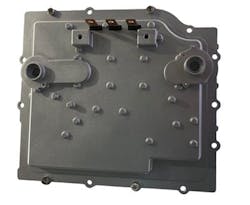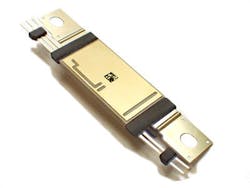According to the market research firm IHS, up to 45% of global vehicle production will be electrified by 2025, with around 46 million electrified vehicles being sold annually, rising to up to 57% by 2030 (around 62 million vehicles annually). Inverters, a necessity inside the car if a vehicle is to be able to access ac charging, are one of the most important electrification components and can have a big impact on many aspects of electric- and hybrid-vehicle performance.
Beyond the motor and batteries, the inverter also one of the biggest ticket items on an electrified vehicle. This key device transforms direct current (dc) from the battery pack into an alternating current (dc) to power the vehicle. The number of inverters needed depends on the number electric motors used on the vehicle—generally one per motor.
All of which contributes to the significance of Delphi Technologies’ recent announcement that it has become first in the industry with volume production of a silicon-carbide (SiC) inverter, enabling electrical systems up to 800 V. It thus leads to extended electric-vehicle (EV) range and halves charging times compared with today's 400-V systems.
Delphi’s 800-V inverter uses silicon-carbide MOSFET semiconductors. To produce the 800-V SiC inverter in volume quantities, Delphi is partnering with Cree, a leader in SiC semiconductors—Delphi’s inverters will utilize Cree's Wolfspeed SiC MOSFETs.
“Our collaboration with Cree will create a significant benefit to automakers as they work to balance meeting stricter global emissions regulations with consumer appetite for electric vehicles. Overcoming driver anxiety related to electric-vehicle range, charging times, and cost will be a boon for the industry,” said Richard F. Dauch, Chief Executive Officer, Delphi Technologies.
Delphi also recently secured a $2.7 billion customer win for volume production of this technology over eight years with a firm it described as a “premier global OEM.” Launch is expected in 2022, initially “for a high-performance vehicle operating at up to 800 V.”
"Doubling the voltage from today's typical 400 V brings a substantial range of benefits, both for the vehicle user and for the vehicle manufacturer," explained Dauch. "We have designed this technology to simplify vehicle manufacturers' multi-voltage strategy as they extend their electric- and hybrid-vehicle ranges."
At the heart of the new Delphi Technologies inverter is its patented Viper power switch, which combines high levels of integration with a cooling design that’s thermally conductive on both sides. The double-sided cooling reduces power-module heat and delivers better reliability in a more compact design. It also permits much higher power outputs, increasing hybrid- and electric-vehicle range. These features allow the company to develop inverters that are said to be 40% lighter and 30% more compact than competing inverter technologies.
Shown are Delphi Technologies’ 800-V SiC inverter (top) and its Viper 4 inverter power switch (bottom).
The latest addition to the Viper power-switch range replaces conventional silicon with silicon carbide, a high bandgap semiconductor that enables very fast switching and can operate at higher temperatures. Faster switching means lower losses in the system. Lower heat allows for a better-cooled package and simpler thermal management; air cooling may well be sufficient and no costly liquid cooling systems are required (or if liquid cooling is still needed, engine coolant could be used).
"The faster switching alone will allow faster, more compact, and lighter motors that offer great efficiency and greater range," said Dauch. "That's in addition to the many benefits of moving to 800 V."
The new silicon-carbide Viper power switch fits into the same inverter package as the current silicon switch, reducing engineering costs associated with a technology change and simplifying the design of multiple vehicle options.
Operating at 800 V, the Delphi SiC inverter provides added flexibility to optimize other powertrain systems. Options include more range or a smaller battery; ultra-fast charging or smaller, lighter, cheaper cables; and greater harvesting of vehicle kinetic energy when braking, further extending vehicle range.



